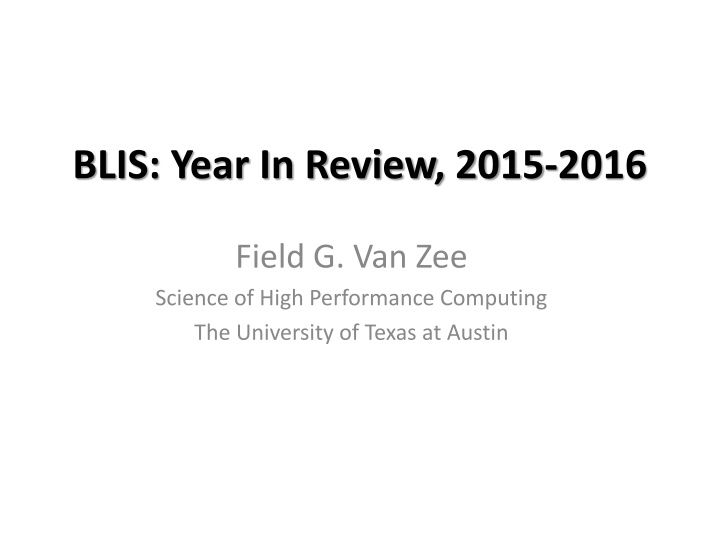
High Performance Computing Research and Funding Overview
Explore the science of high-performance computing by delving into the research group at The University of Texas at Austin, led by Robert A. van de Geijn. Learn about SHPC funding from NSF grants and industry support, as well as key publications and team credits. Discover the significance of BLAS and its role in dense linear algebra applications.
Download Presentation

Please find below an Image/Link to download the presentation.
The content on the website is provided AS IS for your information and personal use only. It may not be sold, licensed, or shared on other websites without obtaining consent from the author. If you encounter any issues during the download, it is possible that the publisher has removed the file from their server.
You are allowed to download the files provided on this website for personal or commercial use, subject to the condition that they are used lawfully. All files are the property of their respective owners.
The content on the website is provided AS IS for your information and personal use only. It may not be sold, licensed, or shared on other websites without obtaining consent from the author.
E N D
Presentation Transcript
BLIS: Year In Review, 2015-2016 Field G. Van Zee Science of High Performance Computing The University of Texas at Austin
Science of High Performance Computing (SHPC) research group Led by Robert A. van de Geijn Contributes to the science of DLA and instantiates research results as open source software Long history of support from National Science Foundation Website: http://shpc.ices.utexas.edu/
SHPC Funding (BLIS) NSF Award ACI-1148125/1340293: SI2-SSI: A Linear Algebra Software Infrastructure for Sustained Innovation in Computational Chemistry and other Sciences. (Funded June 1, 2012 - May 31, 2015.) Award CCF-1320112: SHF: Small: From Matrix Computations to Tensor Computations. (Funded August 1, 2013 - July 31, 2016.) Award ACI-1550493: SI2-SSI: Sustaining Innovation in the Linear Algebra Software Stack for Computational Chemistry and other Sciences. (Funded July 15, 2016 June 30, 2018.)
SHPC Funding (BLIS) Industry (grants and hardware) Microsoft Texas Instruments Intel AMD HP Enterprise
Publications BLIS: A Framework for Rapid Instantiation of BLAS Functionality (TOMS; in print) The BLIS Framework: Experiments in Portability (TOMS; in print) Anatomy of Many-Threaded Matrix Multiplication (IPDPS; in proceedings) Analytical Models for the BLIS Framework (TOMS; in print) Implementing High-Performance Complex Matrix Multiplication (TOMS; in revision)
BLIS Credits Field G. Van Zee Core design, build system, test suite, induced complex implementations, various hardware support (Intel x86_64, AMD) Tyler M. Smith Multithreading, various hardware support (IBM BG/Q, Intel Phi, AMD) Devin Matthews Build system, kernel improvements, BLAS/CBLAS layer enhancements, and more Francisco D. Igual Various hardware support (Texas Instruments DSP, ARM) Xianyi Zhang Configure-time hardware detection, various hardware support (Loongson 3A) Several others Bugfixes and various patches Robert A. van de Geijn Funding, group management, etc.
Review BLAS: Basic Linear Algebra Subprograms Level 1: vector-vector [Lawson et al. 1979] Level 2: matrix-vector [Dongarra et al. 1988] Level 3: matrix-matrix [Dongarra et al. 1990] Why are BLAS important? BLAS constitute the bottom of the food chain for most dense linear algebra applications, as well as other HPC libraries LAPACK, libflame, MATLAB, PETSc, etc.
Review What is BLIS? A framework for instantiating BLAS libraries (ie: fully compatible with BLAS) What else is BLIS? Provides alternative BLAS-like (C friendly) API that fixes deficiencies in original BLAS Provides an expert object-based API Provides a superset of BLAS functionality A productivity lever A research sandbox
Current status of BLIS License: 3-clause BSD Current version: 0.2.0-60 Reminder: How does versioning work? Host: http://github.com/flame/blis Documentation / wikis GNU-like build system Configure-time hardware detection (some x86_64) BLAS / CBLAS compatibility layers
Current status of BLIS Multiple APIs BLAS-like, object-based (+ BLAS, CBLAS) Generalized hierarchical multithreading Extract parallelism from multiple dimensions Comprehensive, fully parameterized test suite
Whats New: Performance Quadratic partitioning for multithreading Miscellaneous kernel improvements
BLIS multithreading OpenMP or POSIX threads Loops eligible for parallelism: 5th, 3rd2nd, 1st Parallelize two or more loops simultaneously Which loops to target depends on which caches are shared 4thloop requires accumulation (mutual exclusion) Implemented with a control tree-like mechanism Controlled via environment variables BLIS_JC_NT (5thloop) BLIS_IC_NT (3rdloop) BLIS_JR_NT (2ndloop) BLIS_IR_NT (1stloop)
BLIS multithreading Quadratic partitioning
BLIS multithreading n m w n / 4
BLIS multithreading n n w ?
BLIS multithreading n m w ?
BLIS multithreading Quadratic partitioning Affects: herk, her2k, syrk, syr2k, trmm, trmm3 Arbitrary quasi-trapezoids (trapezoid-oids?) Arbitrary diagonal offsets Lower- or upper-stored Hermitian/symmetric or triangular matrices Partition along m or n dimension, forwards or backwards This matters because of edge case placement Subpartitions guaranteed to be multiples of blocking factors (ie: register blocksizes), except subpartition containing edge case, if it exists
BLIS multithreading Quadratic partitioning How much does it matter? Let s find out! Test hardware 3.6 GHz Intel Haswell (4 cores) Test operation Hermitian rank-k update: C += A AH +=
Miscellaneous Kernel Improvements Various kernel updates AMD Bulldozer/Piledriver/Steamroller (Etienne Sauvage) ARM (Francisco Igual) Sandybridge, Haswell (Field Van Zee, Devin Matthews) Added native complex domain kernels for gemm Relaxed alignment requirements
Whats New: User Experience configure script Build time BLAS/CBLAS Test suite POSIX threads New operations
configure script Added new configure (plus long-style) options (Devin Matthews) enable/disable debugging symbols specify multithreading model (OpenMP/pthreads) enable/disable BLAS/CBLAS compatibility layers enable/disable static/shared library builds specifying internal and BLAS integer sizes enable/disable verbose output specify C compiler (support for gcc, icc, clang) determines actual flags for things like multitheading
Build time BLAS/CBLAS compilation Previously, all files were compiled C preprocessor guards determined whether symbols were included in object files Now, build system is aware of BLAS/CBLAS enabled- ness Compilation time cut by about 20% Many files containing object-level API code were retired/consolidated level-2 and level-3 Compilation time cut by about 15%
BLAS/CBLAS compatibility Recall: BLAS compatibility layer Supports 32- and 64-bit integers independent of integer size used internally within BLIS CBLAS compatibility layer Original netlib/ATLAS code expressed in terms of int Now expressed in terms of BLAS compatibility layer integer: f77_int Better integration when using 64-bit integers
Test suite New alignment switch Perform tests using matrices with or without forced alignment (starting address and leading dimension) Specialized randnv, randnm operations Randomizes with powers of two in a narrow range Provides a useful second opinion in certain marginal cases (numerically-speaking) Added at AMD s request bli_clock() reimplemented (Devin Matthews) Migrated away from deprecated gettimeofday() Now use clock_gettime()
POSIX threads Use gcc increment-and-fetch instead of pthread_mutex (Jeff Hammond) Define a barrier for environments where _POSIX_BARRIER is not defined (Tyler Smith) OS X Use spin locks instead of pthread barriers (Tyler Smith)
New operations axpy-like operations (Devin Matthews) axpby y := alpha x + beta y xpby y := x + beta y
Whats New: Developer Experience Kernel maintenance Memory allocator Runtime contexts Redesigned control trees Reorganized APIs for multithreading
Kernel Maintenance Kernels directory reorganized Named using microarchitectures (e.g. haswell) instead of vector instruction set (e.g. avx) Use restrict keyword in all kernel APIs (Devin Matthews) Allows the compiler to assume no aliasing between restrict pointers Facilitates some compiler-level optimizations
Memory Allocator Implemented developer-configurable malloc() and free() for three categories of allocation pool: used to allocate blocks for the pools of packing buffers user: used to allocate when the user implicitly allocates memory, e.g. bli_obj_create() internal: used internally within BLIS to allocate data structures such as control tree nodes
Memory Allocator Allow runtime resizing of memory pools If blocksizes change at runtime, memory pools will be re-initialized automatically Integrated a new memory broker abstraction (Ricardo Magana) facilitates multiple pools, one per memory space lays the foundation for using BLIS on NUMA systems
Runtime Contexts Introduced in the big commit (537a1f4) Originally Lee Killough s idea, during early design discussions Basic idea: architecture-sensitive parameters such as cache and register blocksizes are stored, and passed down the function stack, in a special structure called a context (cntx_t) Lays the groundwork for hardware auto-detection runtime management of kernels Other possible applications Provide different contexts to different threads?
Redesigned Control Trees Previously, variant subproblems were encoded child nodes/branches This resulted in more complicated code with many function calls with quick returns (NULL branches) New design linearizes the trees (chains?) Suggested by Tyler Smith, independently implemented in TBLIS by Devin Matthews Now two types of nodes: partitioning (e.g. blocked variants) and non-partitioning (e.g. packing)
Redesigned Control Trees Benefits Simplified level-3 blocked variant code (a lot) Consolidation of gemm_t, packm_t, and trsm_t control tree node types into a single type, cntl_t Fewer barriers and broadcasts (when multithreading) Now allows experts to build custom trees that specify alternative implementations without needing to first integrate those codes into BLIS No longer stateless: cache packing buffers (memory pool blocks)
Reorganized Multithreading APIs Streamlined namespaces/types bli_thrcomm_*() Thread communicator API bli_thrinfo_*() Thread info (aka thread control tree ) API bli_thread_*() Other thread-related APIs Types: thrcomm_t, thrinfo_t Consolidated thrinfo_t structures across level-3 operations Only two kinds now: gemm and trsm thrinfo_t now mirrors cntl_t
Future Plans Carouseling (Tyler Smith) Parallelize 4thloop Multithreaded pack-and-compute optimization Runtime management of kernels Allows runtime hardware detection Allows expert to manually change micro-kernel and associated blocksizes at runtime Create more user-friendly runtime API for controlling multithreading Possible new kernels/operations to facilitate optimizations in LAPACK layer Integrate into successor to libflame Other gemm algorithms / partitioning paths (Tyler Smith)
Further Information Website: http://github.com/flame/blis/ Discussion: http://groups.google.com/group/blis-devel http://groups.google.com/group/blis-discuss Contact: field@cs.utexas.edu 46






















